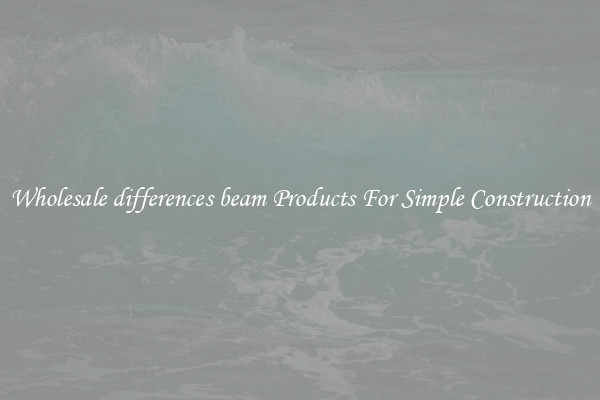Wholesale differences beam Products For Simple Construction
When it comes to construction projects, there is a wide array of beam products available in the market. However, it is important to understand the differences between these products in order to choose the most suitable option for your project. Wholesale differences in beam products can vary in terms of material, size, and shape, each offering their own unique advantages and applications.

One of the most common types of beam products is the steel beam. Steel beams are known for their strength and durability, making them suitable for heavy-duty applications. These beams are versatile and can be used in a wide range of construction projects, from residential buildings to bridges. Steel beams are available in various sizes and shapes, including I-beams, H-beams, and S-beams, each offering different load-bearing capacities and structural properties.
Another popular option is the timber beam. Timber beams are commonly used in residential construction and have a more traditional appeal. They are lightweight, easy to work with, and provide a natural and warm aesthetic to any structure. Timber beams can be found in different wood species, such as pine, oak, or cedar, each with its own characteristics in terms of strength, durability, and appearance.
In recent years, there has been a growing demand for alternative beam materials, such as composite beams. Composite beams are made of a combination of materials, typically a mix of wood and plastic or fiber reinforcements. These beams offer a high strength-to-weight ratio, are resistant to rotting or warping, and require minimal maintenance. Composite beams are often used in outdoor structures, such as decks, pergolas, and gazebos.
Additionally, there are concrete beams, which are known for their exceptional strength and load-bearing capacity. Concrete beams are commonly used in commercial and industrial construction, where high strength and durability are required. They are available in various precast sizes and shapes, including rectangular, T-shaped, and L-shaped beams, which can be easily connected to form a solid structure.
In conclusion, when it comes to beam products for simple construction, it is important to consider the specific requirements and constraints of your project. Wholesale differences in beam products can range from materials, such as steel, timber, composite, or concrete, to different sizes and shapes. By understanding the characteristics and advantages of each type of beam, you can make an informed decision and choose the most suitable option for your construction needs.

View details

View details

View details

View details








